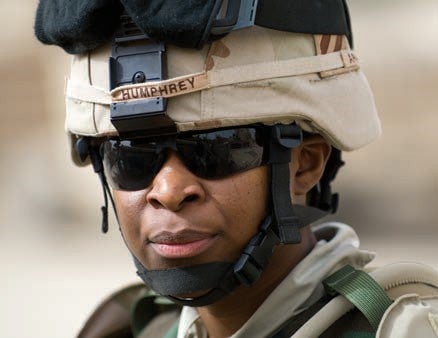Women in the Army, Serving Outside the Wire: Two Humint Specialists
Women in the Army, Serving Outside the Wire: Two Humint Specialists
Human intelligence (HUMINT)-gathering at the unit level in Iraq isn’t a 007-style enterprise. It’s plugging away, day after day, collecting bits and pieces of information—some big, some small—and trying to piece the local puzzle together; meanwhile, passing all the chunks up the chain so somebody else might fit them into the bigger picture. A quilt is made from scraps.
And it isn’t throwing a towel over your head and sneaking behind the lines. Heck, in Iraq, when the rear bumper of your vehicle passes the gate, you ARE behind the lines.
Tactical HUMINT teams (THTs) go deliberately about their business with a difficult-to-disguise robust personal security detachment. To get the intelligence back, you’ve got to get the THT back.
To the uninitiated observer, the public side of it looks pretty much like chatting—two distinctive brands: one conducted while sipping Iraqi tea, chai, with locals or Iraqi officials and the other while not sipping.
Sometimes, a THT gets a juicy piece of information, sometimes not.
A THT works off a list of priority intelligence requirements (PIRs)—essentially, as the name states, top questions for which a unit needs answers.
Sgt. Nicola Humphrey and Spc. Julia Cuder, a HUMINT team supporting the 3rd Infantry Division’s (Mechanized) 2nd Brigade in eastern Baghdad, took me with them on a PIR foray.
We stopped first at a major local police station so the team could check some information with the station chief and fish around for whatever might pop up.
It was a sipping occasion, and while the chief and team were sipping, an Iraqi general sauntered in, stopping to sip a little himself and eventually spilled a few beans in the bargain. It turns out that he knew that a possible insurgent on the American list had been taken into custody under a fake name.
The Americans instantly realized that they had to get to him fast, before enough money passed over the desk of the right person to get him sprung. It happens.
“We’ve got a confirmed name. We’ve got to pounce on it,” Sgt. Humphrey said. “Sometimes, like today, we get lucky.”
The team’s next stop was a squatter’s village, where the soldiers talked to several inhabitants, mostly about how things were going (terrible) and what kind of assistance they were getting (none) to help gauge the public’s mood and inclination towards the command.
After a while, the THT got to the meat of the stop: “Oh, yeah, by the way, do you know where mortar shots might be coming from or who might be doing it?”
The third and final stop was to talk to a wannabe informant—a minor league somebody who knew somebody who knows something.
The meeting was conducted in daylight, but on a back road with as much distance as possible from buildings and prying eyes and ears.
Two Iraqi guys strolled up. Everybody talked for a while. Everybody shook hands, and the THT jumped back into the Humvees. Not much to tell. The THT has to see how it progresses, and then double and triple check the information.
So HUMINT goes—a little here, less there and occasionally a hard-and-fast maybe. Then, the next day, the THT goes out and does it again.
The difference between the THT that I accompanied and any other in Iraq is that both team members are female— not so remarkable in the U.S. Army these days, there are probably plenty of all-female THTs, but it is an initial jawdropper to the mostly male Iraqis with whom the team needs to interact and influence. It makes that THT’s job a little more delicate and difficult, but not really that much, according to the American women.
Suffice it to say, however, that Arab men in general make Archie Bunker look like a Renaissance man.
“They are shocked to see a woman in charge,” Spc. Cuder noted. “But it’s our job to make them deal with us, and we’re good at what we do, so it’s our job to get the information from them. The degree to how confident they are in us relates directly to how much we have to assert ourselves.”
“Initially, they are reluctant,” Sgt. Humphrey added. “But as time goes on they see that you really are in charge. It’s just a matter of rapport building.”
Spc. Cuder, from Corona, Calif., said that she came into the Army to get intelligence training and some hands-on experience and decide whether to continue in the Army or shop those skills to a different agency. At the time, she had been in the Army for about 18 months.
It was the first deployment to Iraq for both of them.
“It really doesn’t matter which sex you are to do our job; we can fit into any culture,” Spc. Cuder said. “But [the Iraqis] are seeing a side of our culture that they wouldn’t normally see.”
For the common Iraqi, more than for Iraqi officials who might be more sophisticated or accustomed to it, it is a big surprise to see women doing what they consider a man’s job. “For example, an Iraqi woman on the street holding a baby is completely surprised to see a female soldier,” Spc. Cuder explained.
Sgt. Humphrey believes that American female soldiers are serving as an example for Iraqi women.
“Iraqi women can look at us and see that women can be in authority,” she said. “They—especially the young Iraqi women and girls—see that women can be in charge and say to themselves, ‘That could be me.’ Our gender is not so much a factor in us doing our job and doing it successfully, but I think it can be a factor in Iraq’s future.”


